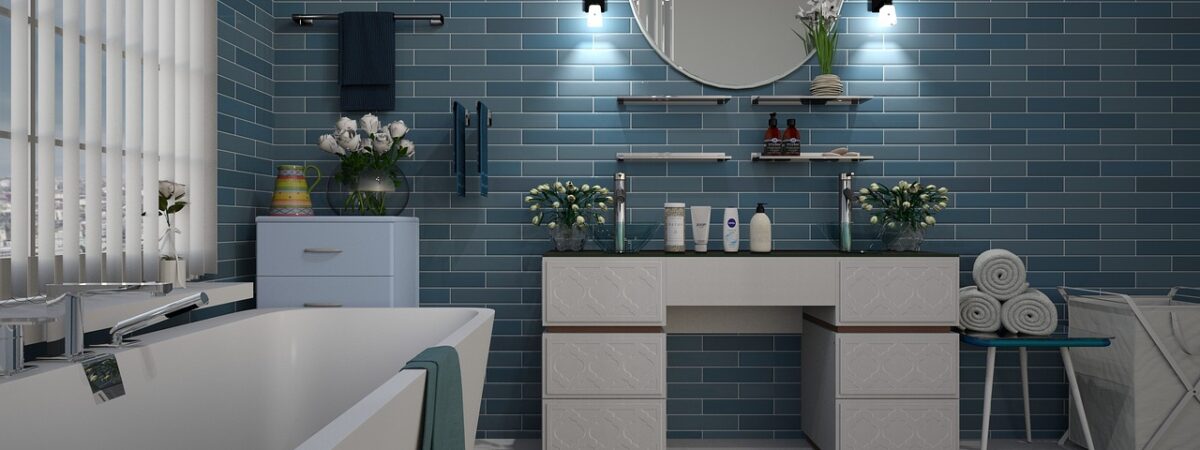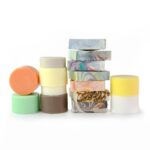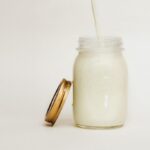Choosing to make sustainable bathroom swaps is a really rewarding process. There are lots of simple changes you can make in the bathroom that can hugely reduce your environmental impact and don’t take much time or effort.
Lots of these things you might already be doing or have tried once or twice. Choose a couple and make them a sustainable bathroom routine and the others will easily follow. As soon as you start thinking about it, you’ll find all kinds of ways to make your bathroom more eco-friendly. You’ll discover some great alternatives you never knew existed.
Switch to solid shampoo for a more sustainable bathroom
We’ve been using solid shampoo for a couple of years now and will never go back to plastic bottles. It can take a while to find one that works well with your hair type but once you do there’s no looking back. We wrote a whole post on all the reasons to switch to solid toiletries and one of the biggest reasons is the elimination of plastic bottles from your sustainable bathroom. The environment and your hair will thank you!
Use solid soap instead of handwash
If you’ve made the switch to solid shampoo why not go completely solid and use a bar of soap instead of liquid handwash. It lasts much longer and can be bought completely zero waste, to create a more sustainable bathroom. There are some great options available from expensive gift soaps to the standard supermarket bars. We make sure to buy ones that are chemical-free in case we take them travelling and we’re planning to collect our grey-water when we move into our tiny house.
We love Ecostore and Blue Earth which are available in cardboard boxes from most NZ supermarkets or packaging-free in lots of bulk and eco stores. If solid soap doesn’t appeal, find a place that will refill your handwash to save buying a new bottle each time.
Switch to sustainable toilet paper
It’s pretty hard to find toilet paper in the supermarket that doesn’t come wrapped in plastic. That’s why we switched to getting our toilet paper delivered in bulk in a cardboard box. The toilet paper is made from sustainably grown bamboo and is soft and strong. Both SmartAss and GreenCane deliver within NZ and have plastic-free options for both toilet paper and kitchen roll.
Wash your towels less
If you only use your towel to dry yourself once you’re clean and hang it somewhere it can dry out then there’s no reason to wash your towels more than once a week. Less frequent washing saves on water and energy and prevents the towels from wearing out so quickly.
Use ethical makeup brands
My personal solution to make up is to just go without but I appreciate there are lots of people who like to wear makeup on special occasions or even every day. Do some research into ethical makeup brands and do your best to find any that come in sustainable packaging. Lots of makeup is tested on animals and contains all kinds of chemicals and substances that harm the environment. Check out this article for some great brands that will leave you and the earth looking great.
Reduce your shower time
Turning that shower off just a minute earlier can be a great way to save both water and energy. See if you can cut your shower routine shorter by just a few seconds each day in order to conserve as much as you can. If you still prefer longer showers try an eco shower head which reduces the amount of water which flows from the shower. Alternatively, turn the shower off while you lather and switch it back on again to rinse.
Use natural cleaning products
I’ve been pleasantly surprised in our hunt for eco-friendly cleaning products. There is a range of products available including refillable ones which means we can use options that are safe for the environment and plastic-free. There is also a whole range of cleaning products you can make yourself using simple ingredients such as baking soda and vinegar.
Use a metal safety razor fore a sustainable bathroom routine
This is a really simple switch that will save loads of plastic from landfill. Buying a metal safety razor to replace disposable razors does come with an initial investment but at the price of razors these days it won’t take long for you to make your money back. You need to shave a little more carefully but in the end, you get a great, close shave and the blades can be collected in a tin can and sent for recycling.
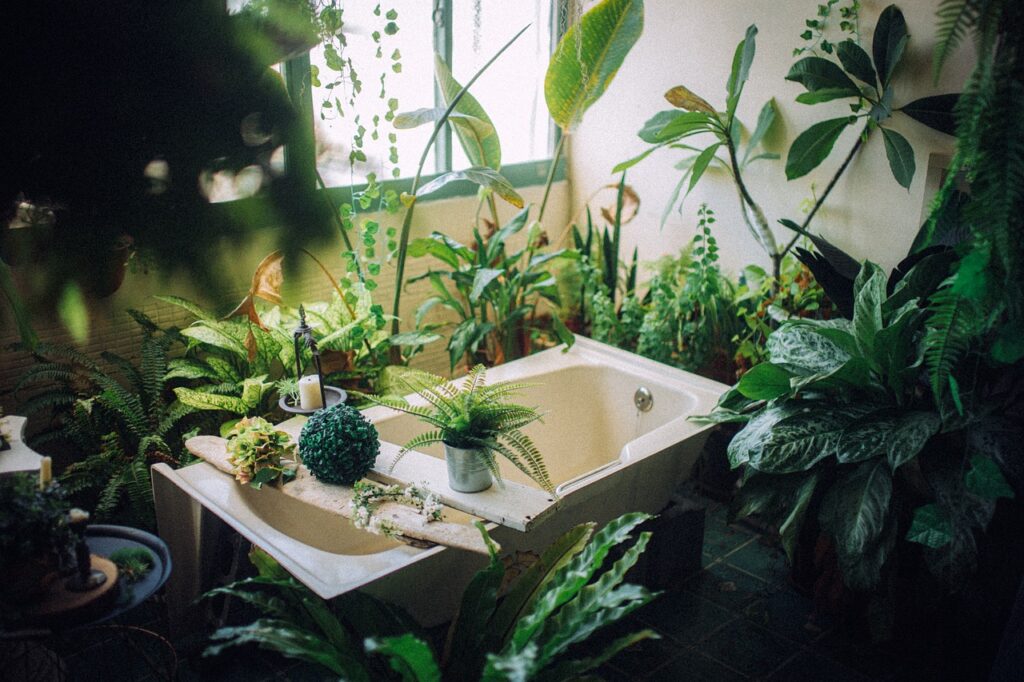
Spot wash your clothes
How often do you throw your clothes into the wash when really it’s only one small spot that needs cleaning? Save on energy and water by buying a stain remover or laundry bar and scrubbing the dirty patch and hanging your clothes to dry. Of course, you can still wash sports clothes and t-shirts etc normally but for that clean top you put on and then spilt something on, try a spot wash! We love the Ethique Laundry Bar.
Wash a full cold load
Washing your clothes on a colder wash reduces your energy use and helps your clothing last longer. Using 40°C or less should be sufficient for most normal loads. You can also be more eco-friendly by making sure you’re washing a full load. The more space the clothes have the more friction they create and this increases the number of microfibres released into the water.
Use soap nuts or homemade laundry detergent
There are lots of reasons not to use shop-bought laundry detergents and there are lots of easy ways to make your own laundry detergent. This helps to reduce the chemicals and still gives you fresh clean clothes at the end.
Soap nuts are an interesting concept and people often take a while to come around to the idea. They are a natural berry shell which is grown in the Himalayas that contains a natural cleaning agent called saponin. They naturally foam when put in water and you can use the nuts multiple times.
Each load needs around 5 nuts which leaves the clothes clean and neutral smelling. They won’t leave a floral scent or anything fancy but we washed a load with soap and nuts and a load with detergent and couldn’t smell a difference. They’re a great natural alternative to laundry detergent and are cheap and easy to buy.
Switch to aluminium pegs
This is a long term solution and should be implemented over time. Rather than throwing out all your plastic pegs to make space for their aluminium equivalents just wait until your plastic ones break before replacing them. But once you have set of aluminium pegs you’ll never need to buy any others. They last forever and are strong and recyclable.
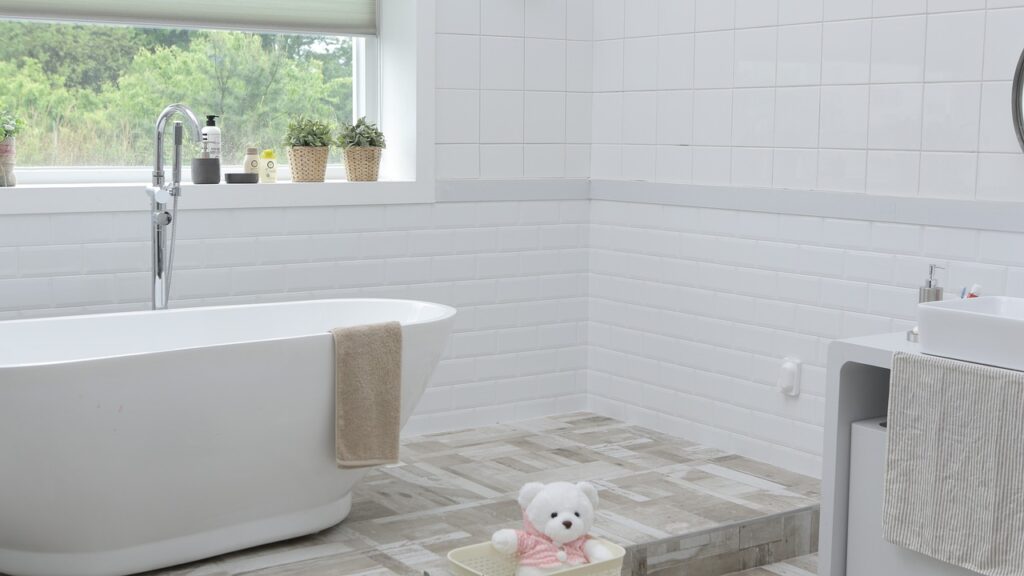
Use a coraball
This is a new concept to us but now that we’ve dealt with lots of the large plastic use in our lives we’ve started looking at smaller plastic uses that we can avoid. This led us to look into microplastics.
Most of our clothing is made from natural materials but we have a few items that aren’t so we’re considering getting a Coraball which collects all the microfibres from your load of washing so you can dispose of them properly rather than having them wash out with the water and inevitably into the ocean.
Air dry your clothes
This is a commonly accepted concept in the summer as you see the pleasing sight of fresh washing flapping in a summer’s breeze. But once the cold, dark and wet of winter set in people tend to turn to their old friend the dryer. But this doesn’t have to be the case. If your home is warm and dry (which it hopefully is!) there’s no reason not to dry your clothes on a hanging rack. They may take slightly longer to dry but the savings in energy is well worth it.
Finding a good place to put a drying rack can often be the hardest part but spare rooms or even a covered porch area are perfect. Even in our tiny house, we plan to install a drying rack on a pulley system so we can dry our washing out of the way up high.
Use dryer balls
If you really do need to use a dryer try using dryer balls. These are felt balls which get put in with your washing and help absorb the moisture so your clothing dries quicker. This reduces your energy use and also saves you time and money. Win-win-win!

